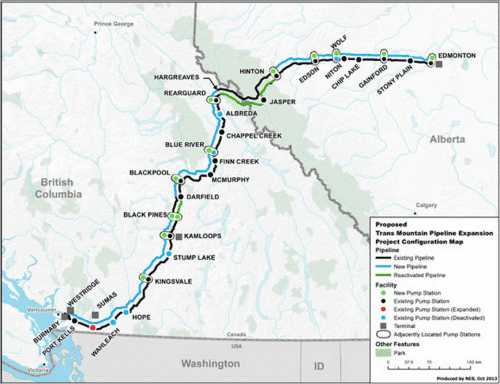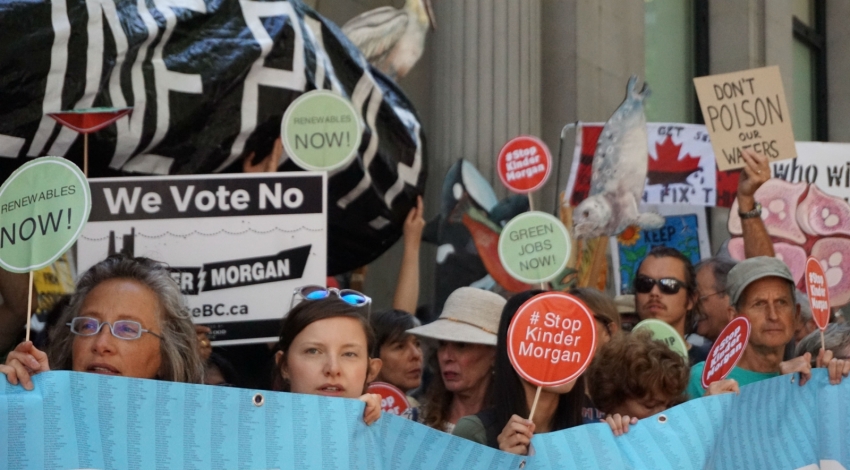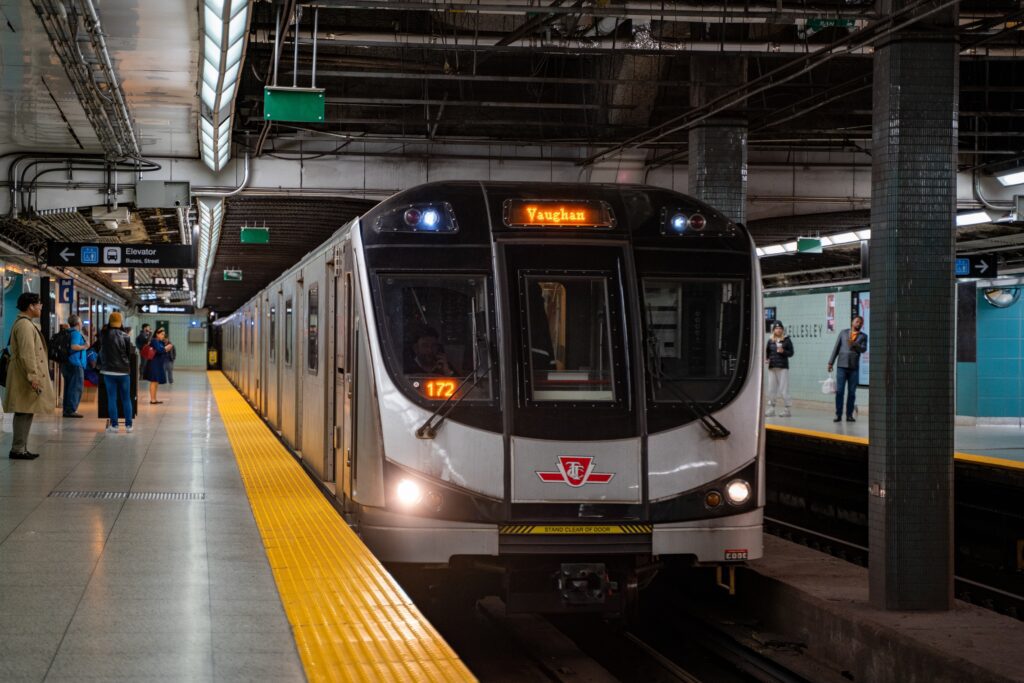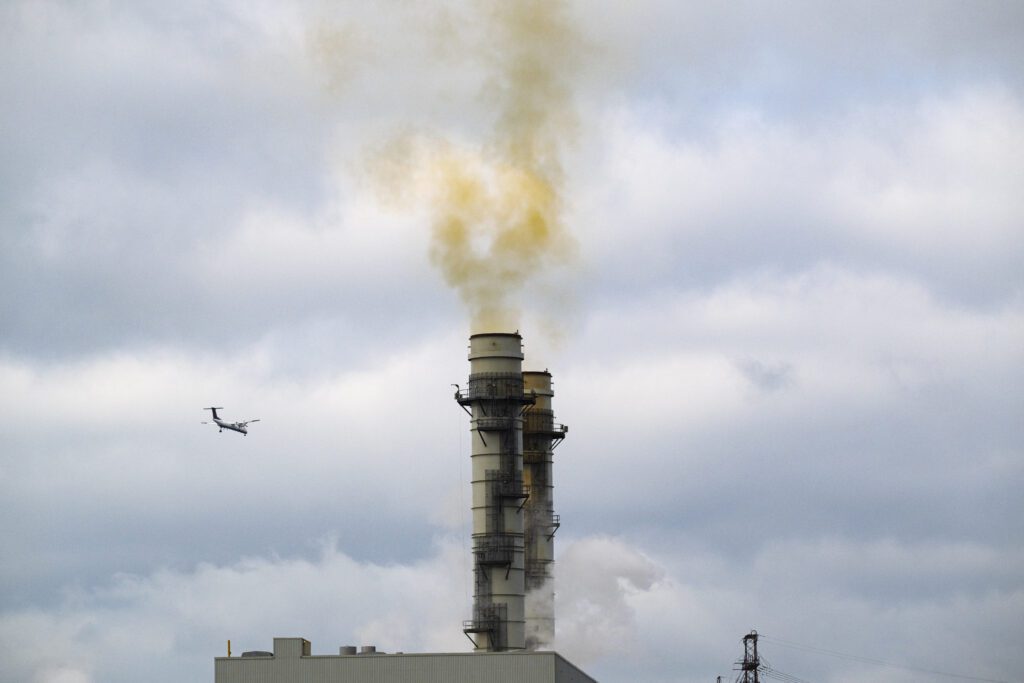Is this what “social license” looks like? The federal government faces enormous pressure from the oil industry to give the green light to Kinder Morgan’s Trans Mountain pipeline and tankers proposal. But the tar sands pipeline poses unacceptable risks to our land, water and shared climate, and its review was mired in controversy and widely seen to lack credibility.

The federal government must decide by December 19 whether or not to allow Texas-based Kinder Morgan to triple the capacity of a 60-year-old pipeline transporting tar sands crude from Edmonton, A.B. to Burnaby, B.C. The expansion would add the annual carbon equivalent of 2.7 million cars to the atmosphere and would increase tanker traffic in Vancouver harbour seven-fold.
The previous federal government introduced changes to the National Energy Board (NEB) pipeline review process in 2012 and 2013, which led many Canadians to believe the review process was rigged in Kinder Morgan’s favour. The current government’s interim measures for pipeline reviews and Ministerial Panel did little to ease those concerns. British Columbians along the pipeline’s proposed route remain overwhelmingly opposed to Kinder Morgan. Last year, the Prime Minister promised to completely restart the review, but since slapped on a band-aid consultation process while relying on the old review to make a decision this fall.
Here are the top 10 reasons the federal government should reject Kinder Morgan (for a complete list, check out our backgrounders):
-
Not “directly affected”? Don’t have “relevant information or expertise”? Can’t afford to attend a meeting? Then stay home. The previous government’s changes to the NEB review process severely limited public participation, essentially barring many Canadians from participating in the consultations. The NEB reduced funding for participants in the pipeline review, while imposing an arbitrary 15-month time limit to analyze Kinder Morgan’s 15,000-page application.
-
West Coast Spill Risk. Kinder Morgan would increase tanker traffic from 60 to 400 tankers in Vancouver’s busy inner harbour, putting at risk 98,000 coast-dependent jobs, salmon rivers, wildlife, tourism opportunities, and the health of B.C. residents. The existing Trans Mountain pipeline has a disgraceful record of 82 separate leak incidents, including four major oil spills since Kinder Morgan purchased the pipeline in 2005.
-
Endangered Orcas. Even without a spill, the project will likely eliminate the endangered southern resident orca whale population from B.C. Just a small rise in tankers will have a big effect as the increase in tanker traffic noise is proven to interfere with their habitat and diet. Pipeline approval would place the federal government in contravention of the Species At Risk Act.
-
Climate impacts were excluded. The initial NEB review did not consider either the upstream or the downstream greenhouse gas (GHG) emissions of Trans Mountain—odd for a pipeline projected to add at least 13 to 15 MT per year from increased tar sands production. When the new federal government required Environment and Climate Change Canada (ECCC) to do its own analysis this year, the ECCC assessment excluded downstream emissions (estimated at 71.1 MT per year) and failed to consider global oil demand forecasts in a post-Paris world. This is inconsistent with Canada’s commitments to climate action and Alberta’s cap on emissions from the tar sands.
-
First Nations Opposition and Inadequate Consultation. The federal government failed to meaningfully consult First Nations. The NEB did not allow First Nations to cross-examine Kinder Morgan’s evidence – although Kinder Morgan could cross-examine First Nations on their oral traditional evidence. Over 150 First Nations and Native American tribes across Canada and the U.S. signed the Treaty Alliance Against Tar Sands Expansion and over 130 First Nations and their allies signed the Save the Fraser Declaration to oppose Kinder Morgan.
-
A Bad Deal for B.C.’s Economy. The proposed pipeline would create just 50 permanent jobs, but threatens $9.7 billion in GDP and 98,000 jobs supported by the B.C. coastline. Kinder Morgan and tar sands producers would collect most of the revenue while B.C. would receive less than 2 per cent of the revenue.
-
NEB accepted Kinder Morgan’s evidence without cross-examination or analysis. The NEB panel ended oral cross-examination of Kinder Morgan’s evidence and allowed inadequate responses to legitimate questions about the pipeline and tankers proposal. The inadequacy of the NEB review led to widespread perception of bias.
-
The Trans Mountain review is the subject of thirteen legal challenges, including from groups and residents excluded from the review process, the cities of Burnaby and Vancouver, and six different First Nations.
-
“Economic Need” for Trans Mountain based on flawed, outdated data. The NEB’s assumptions about the economic need for Trans Mountain are based on flawed, outdated data and analysis and fail to account for efforts to fight climate change and the decreasing global demand for Canadian oil. The ECCC assessment essentially assumes the world will fail in its attempt to limit global warming to 2 degrees Celsius. But the NEB should be working on the assumption that the world’s countries will work to meet their commitments in the UN Paris Agreement, which entered into force internationally this week.
-
Flaws in the summer 2016 Ministerial Panel sessions. This summer’s Trans Mountain Ministerial Panel sessions to “create further opportunities… to provide views on the project” were widely seen as a delay tactic by the federal government. They were poorly promoted, held in the dog days of summer, did not allow adequate time for preparation, and were tainted by conflict of interest allegations against the Panel Chair. In the end, a decisive 91 per cent of people who attended the sessions spoke out against Trans Mountain.
Just like Energy East, the NEB botched the review process for the fundamentally flawed Kinder Morgan pipeline proposal. Canadians deserve a credible review process for major energy and industrial projects and the present government promised to restore public confidence in the process.
But even the recent Ministerial Panel report concludes that “there remains a strong public perception that there were significant gaps in the NEB review and a sincere concern about the social, economic and environmental impacts of the Trans Mountain Pipeline proposal.”
The Kinder Morgan project, and the process to review it, are fatally flawed. It’s time for Ottawa to end the charade and reject Trans Mountain.








